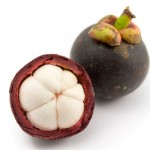I started reading the New York Times breaking news on my Kindle this morning and ran across a story titled "Support is Mutual for Senator and Utah Industry." The photo below the byline showed US Senator Orin Hatch at the HQ of one of his state's firms; this one puts out a $40 bottle of fruit juice. Well, that's a lot more than I usually pay (and I almost always buy fruit, not juice, anyway). But my interest was piqued, so I read the story and then did background research.
The fruit involved in the mangosteen, a name I vaguely remembered from my Air Force tour in the Philippines. It's been used in medicinal products in India and China for many years, but much more recently sold in mixed juice form in the United States with fairly incredible health claims (improves immunity, fights cancer, has anti-aging properties).
The Memorial Sloan-Kettering Cancer Center website says, "Despite claims by several marketers, the efficacy and safety of mangosteen products for cancer treatment in humans has not been established." They do mention that several small studies suggest it may be beneficial for halitosis, but also note at least one person who suffered a major side effect after prolonged use of mangosteen juice.
I was able to find a single randomized, double-blind, placebo-controlled trial that demonstrated some laboratory evidence of changes in immune function in a small group of 40 to 60-year-old who took a mangosteen product that also contained multivitamins and "essential minerals" over a 30-day period. The study participants who got the combination product also felt their health improved.
So is this another expensive scam or will further study find we should all consider drinking mangosteen juice? Frankly I don't know, but I'd bet it's going to be hard to find out.
In March of this year, a Board Certified Family Practice physician who is now on the "mangosteen circuit" apparently spoke at the central Utah headquarters of the firm producing the miracle juice and claimed it had "anti-tumor," "anti-obesity," "anti-aging," "anti-fatigue," "antiviral," "antibiotic," and "anti-depressant" properties.
When asked how he knew the juice wasn't snake oil, he replied, "A company that is selling snake oil is not going to stay in business for 11 years and grow as fast as this company is growing."
That's strange. If I were asked a similar question I'd want to be able to show solid, evidence-based data generated by researchers who have no financial interest in the company.
But the senator has apparently been the focal point for legislation that says nutritional supplement companies can bring out new products without FDA approval and make lots of general health claims without studies of safety or effectiveness.
Oh, and by the way, the New York Times mentioned that the doctor making all those sweeping statements has had his license to practice revoked on two occasions, for charges including prescribing excessive amounts of narcotics and for giving a weight-loss clinic signed, blank prescription forms.
He's not my idea of an ideal spokesperson.


